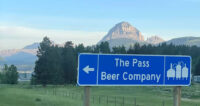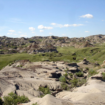The price of progress
By Lethbridge Herald Opinon on August 12, 2020.
Monica Field
In the words of John Prine, describing Paradise, Kentucky:
Then the coal company came with the world’s largest shovel
And they tortured the timber and stripped all the land
Well, they dug for their coal till the land was forsaken
Then they wrote it all down as the progress of man.
I have watched, for years, as destructive land-use practices and development expanded through the headwaters of the Oldman River, and wondered: Have we lost our sense of gratitude and reverence for our rivers? Have they become nothing more than a low-value commodity, a resource to be squandered until they cease to exist? This is how we, as a society, seem to feel, and it’s how our government acts when addressing industrial and other land-degrading applications.
Nothing is sacred. Nothing is priceless.
It’s as if it’s been quietly decided that our finite natural resources exist for nothing more than blind, short-sighted, exploitation.
The Government of Alberta’s view: If land has no potential for timber harvest, mineral or petroleum production, it’s sterile. I’ve heard this term, “sterile land,” used by government employees, and I can’t recall any resource extraction proposals being denied, regardless of their anticipated impact on the environment. Not even a stunning assembly of profound natural values is viewed as a game-stopper.
I’ve come to believe that, even if unicorns were discovered in the forests and mermaids in the streams, industrial projects would still proceed É that nothing is more compelling and precious than promises – often false – of jobs and money. All other values, even clean drinking water, become incidental concerns. Society seems to accept the ongoing loss of life-sustaining biodiversity in its increasingly desperate attempt to extract profit.
I’ve been told by my MLA that all industrial project proposals will be “rigorously reviewed,” and the Minister of Energy has offered similarly “robust” assurance. Are these statements valid? What I see is a long history of failure. Government regulations don’t translate into on-the-ground protection of the environment, and there’s an apparent lack of commitment by the government to enforce its stated mandate. Also, there are seldom any meaningful consequences for violators. I make these observations based on decades of assessments, dozens of examples.
Here in Alberta, industry appears to police itself under the unwatchful eye of government. And when a citizen reports a violation, she, not the infraction, is seen as the problem. The message: Get out of the way; don’t stand in the path of progress.
Back up two steps and look toward the mountains. We all love the mountains. We go there to recreate in the shade of cool mountain streams. We all see value in nature, even if some recreational users tear up the land, drive other users away, and degrade the watershed. Everywhere on the public lands we love there’s shrinking beauty. There’s mud, dust, and a prevailing perception of chaos. It’s a place where, to quote from my song, Mountain Freedom, “there ain’t no bleepin’ rules.”
It sounds romantic to have no rules, to have freedom. But, if everyone is allowed to do exactly as they wish on the land, we end up living in the wild west, where bands of bullies hold the keys to the headwaters.
The answer: Meaningful regulations and effective enforcement are required to protect the “commons” for common good.
A question emerges at forest’s edge: How can Albertans have such a deep appreciation for the land and its vital watersheds while constantly allowing the sacrifice and degradation of these priceless resources for some individuals’ personal pleasure and for a select few corporations’ short-term economic benefit?
Monica Field lives in southwestern Alberta in the shadow of the Livingstone Range. She’s in love with the land at her doorstep, and has worked from it to manage Provincial Historic Sites in Alberta. Monica has also been an active educator specializing in diverse cultural resources and natural history disciplines. She has extensive knowledge of Alberta’s archeology, botany, paleontology, geology and the province’s history of coal mining and oil and gas exploration.
21-20




